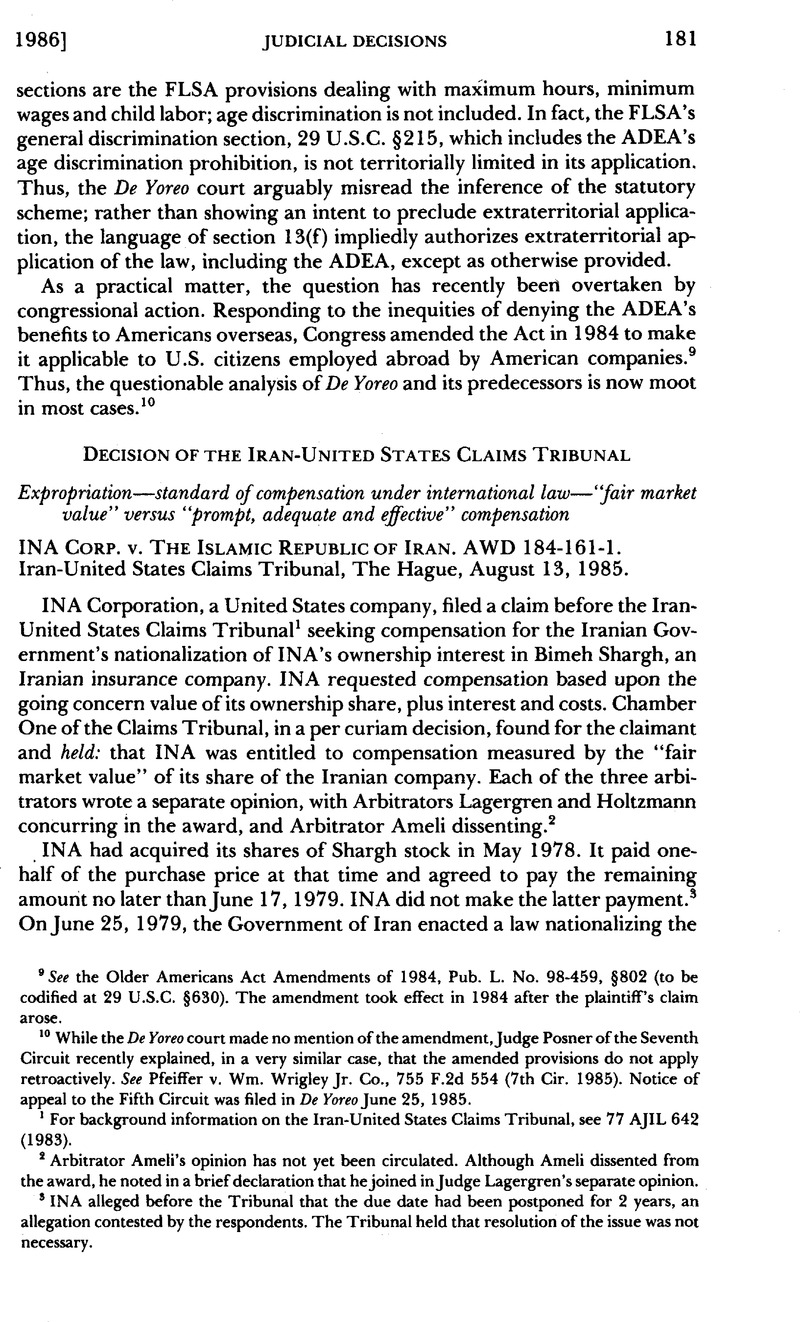No CrossRef data available.
Published online by Cambridge University Press: 27 February 2017

1 For background information on the Iran-United States Claims Tribunal, see 77 AJIL 642 (1983).
2 Arbitrator Ameli’s opinion has not yet been circulated. Although Ameli dissented from the award, he noted in a brief declaration that he joined in Judge Lagergren’s separate opinion.
3 INA alleged before the Tribunal that the due date had been postponed for 2 years, an allegation contested by the respondents. The Tribunal held that resolution of the issue was not necessary.
4 Aug. 15, 1955, 8 UST 899, TIAS No. 3853.
5 In so holding, the Tribunal reviewed and dismissed as unreliable the audit on which the Iranian Government relied to show that the company had become worthless.
6 See, e.g., 1 L. Oppenheim, International Law 352 (8th ed. H. Lauterpacht 1955); Dolzer, , New Foundations of the Law of Expropriation of Alien Property, 75 AJIL 553, 557 et seq. (1981)Google Scholar.
7 GA Res. 1803, 17 UN GAOR Supp. (No. 17) at 15, UN Doc. A/5217 (1962).
8 For example, Judge Lagergren quoted Texas Overseas Petroleum Co./California Asiatic Oil Co. v. Government of the Libyan Arab Republic, 17 ILM 3, 30, para. 87 (1978), 53 ILR 389 (1977) [hereinafter cited as TOPCO], where the arbitrator explained that “the test of ‘appropriate compensation’ had come to represent the ‘opinio juris communis’ that reflected ‘the state of customary law existing in this field’.” He also quoted Kuwait and the American Independent Oil Co., 21 ILM 976, 1033, para. 144 (1982) [hereinafter cited as AMINOIL] (“appropriate” compensation would allow “an enquiry into all the circumstances relevant to the particular concrete case”).
9 See Oil Field of Texas, Inc. and The Government of the Islamic Republic of Iran, ITL 10–43-FT (Dec. 9, 1982) (Full Tribunal), reprinted in 1 Iran-U.S. Claims Tribunal Rep. 347 (1981–82).
10 TOPCO, 17 ILM at 32, 34.
11 Factory at Chorzów (Merits) (Ger. v. Pol.), 1928 PCIJ, ser. A., No. 17.
12 AMINOIL, 21 ILM at 1035–37, 1041.
13 Holtzmann argued that the Tribunal’s award in Oil Field of Texas used the term “appropriate compensation” to emphasize that some compensation was due, but not to suggest that an amount less than full compensation should be paid.
14 American International Group, Inc. and Islamic Republic of Iran, AWD 93–2-3 (Dec. 19, 1983) (Chamber 3), reprinted in 4 Iran-U.S. Claims Tribunal Rep. 96 (1983 III); and Tippetts, Abbett, McCarthy, Stratton and TAMS-Affa Consulting Engineers of Iran, AWD 141–7-2 (June 29, 1984) (Chamber 2) [hereinafter referred to as TAMS].
15 TAMS, supra note 14.